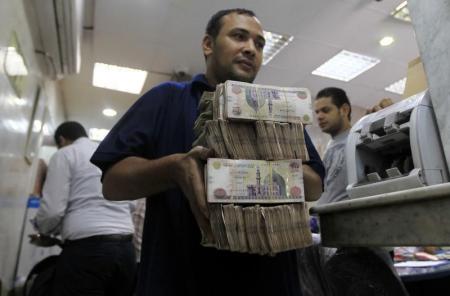
By Arwa Gaballah and Lin Noueihed
CAIRO (Reuters) – Many Egyptians expect the pound to fall further on Sunday when banks begin trading it freely after the country ditched its U.S. dollar peg last week in a bid to end a flourishing black market.
Banks have been open in Egypt over the Friday to Saturday weekend, but interbank trading will only begin again on Sunday at 10 a.m. (0800 GMT) in what is expected to be the first trading session without guidance from the central bank.
Some business executives said the government was betting it could finalise a $12 billion, three-year loan from the International Monetary Fund in coming weeks, and bolster confidence by using the first disbursement to provide foreign currency liquidity.
In the meantime, businesses are braced for more volatility, with many predicting the pound will weaken further because of pent-up hard currency demand.
Bassem Hussein, a manager at family-run Interfood, an importer and processor of coffee and spices, said he had not tried to buy dollars since Thursday and was waiting to see where the market settled.
“I can’t make any prediction… Everyone is holding back…and a lot more decisions are likely to come from the government this week.”
Several businessmen, including an executive at a multinational, said they thought that if the pound plunged on Sunday, companies would hold back from buying dollars to help the new exchange rate system work and avoid steering profits to the black market, which many want to see put out of business.
After floating the pound, initially devaluing it by about a third from the peg of 8.8, the central bank let it drift down to around 15.35-15.75 on Thursday.
The float ended strict rationing of dollar supplies at banks and dealt a blow to a booming dollar black market under the peg.
“I expect the rate to go very high…I expect it to exceed 17, 18,” said one commodity trader who, before the float, financed imports through the black market.
“Demand for dollars will be high. Maybe it will stabilise in the long run, but for sure I’m expecting the rate to jump.”
At the end of last week, non-deliverable forwards priced the pound at 15.95 in three months time and 17.10 in 12 months.
BLACK MARKET ON HOLD
Some Egyptian bankers were disappointed on Thursday that the central bank had not flooded the system with hard currency to help stabilise the pound, saying the black market would return if banks proved unable to meet the demand backlog.
“They can get around the non-intervention policy by indirectly injecting into the market through the state’s banking arms, National Bank of Egypt, Banque Misr and Banque Du Caire,” one capital market professional told Reuters.
Black market traders said they were waiting to see what would happen, with some set to hold a Saturday night crisis meeting in Cairo, one said.
“Prices are very stable at the moment. If the banks tomorrow don’t start selling dollars, the black market will start selling at 17.5 and 18.
“I am not buying dollars at all at the moment… Everyone in the black market is doing the same… because anything they do right now is a gamble. Tension is very high.”
(Additional reporting by Eric Knecht; Editing by Andrew Torchia and Alexander Smith)